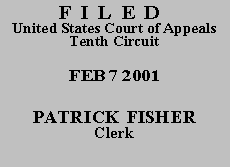

| LARRY EUGENE JACKSON,
Petitioner-Appellant, v. OKLAHOMA DEPARTMENT OF CORRECTIONS; JAMES A. SHAFFER; GARY CARNALIE, Director of Mansfiled Law Enforcement Center; ATTORNEY GENERAL OF THE STATE OF OKLAHOMA, Respondent-Appellee. |
|
Petitioner Larry Eugene Jackson was convicted by a state court jury of possession of marijuana after former conviction of two or more felonies, and possession of drug paraphernalia. He was sentenced by the jury to life imprisonment on the marijuana conviction, and to one year on the drug-paraphernalia conviction. He appeals from the denial of his petition for habeas relief filed under 28 U.S.C. § 2254. A certificate of appealability was granted, counsel was appointed, and the issues have been briefed. We affirm.
In order for appellant to secure a writ under § 2254(d), he must show that the state-court adjudication
(1) resulted in a decision that was contrary to, or involved an unreasonable application of, clearly established Federal law, as determined by the Supreme Court of the United States; or
(2) resulted in a decision that was based on an unreasonable determination of the facts in light of the evidence presented in the state court proceeding.
28 U.S.C. § 2254(d). A state court decision is "contrary to" clearly established federal law "if the state court arrives at a conclusion opposite to that reached by th[e Supreme] Court on a question of law or if the state court decides a case differently than th[e Supreme] Court has on a set of materially indistinguishable facts." Williams v. Taylor, 120 S. Ct. 1495, 1523 (2000). A state court decision is an "unreasonable application" of federal law "if the state court identifies the correct governing legal principle from th[e Supreme] Court's decisions but unreasonably applies that principle to the facts of the prisoner's case." Id. "Under § 2254(d)(1)'s 'unreasonable application' clause, . . . a federal habeas court may not issue the writ simply because that court concludes in its independent judgment that the relevant state-court decision applied clearly established federal law erroneously or incorrectly. Rather, that application must also be unreasonable." Id. at 1522.
Appellant argues on appeal that: (1) the state court unreasonably determined that there was sufficient evidence apart from his non-exclusive access to the bedroom to link him to the .16 grams of marijuana found on the floor of that room, as required to support a conviction for possession in Oklahoma, where there was no proof beyond the fact that appellant was in the room and may have stayed there at times; (2) the state court denied appellant due process by arbitrarily refusing to allow him to reopen his case to present the lone defense witness, who would have testified that appellant did not live at the apartment, and who was present in the courtroom within minutes of when the defense rested and before anything else transpired before the jury; (3) appellant was denied the effective assistance of appellate counsel where appellate counsel did not raise a clear violation of Oklahoma law, which resulted in the jury learning that appellant had a prior marijuana conviction before it determined whether he was guilty of possessing marijuana in this case, proof that was not admissible until the sentencing phase of the trial and that the Oklahoma courts have recognized is inherently prejudicial.
The district court reviewed the evidence presented at trial and determined that appellant had not satisfied the statutory standard. We have reviewed the parties' briefs in light of the record on appeal. We are unpersuaded by appellant's claims of error, and affirm for substantially the same reasons as those set forth in the district court's thorough January 12, 2000 order.
Appellant's motion to supplement the record is granted. The judgment of the United States District Court for the Northern District of Oklahoma is AFFIRMED.
Entered for the Court
Circuit Judge
*. This order and judgment is not binding precedent, except under the doctrines of law of the case, res judicata, and collateral estoppel. The court generally disfavors the citation of orders and judgments; nevertheless, an order and judgment may be cited under the terms and conditions of 10th Cir. R. 36.3.